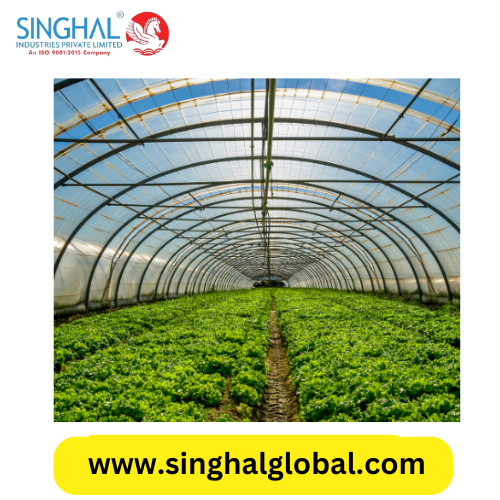Greenhouse films are essential components in modern agriculture, providing a controlled environment for cultivating plants. These films, often made of polyethylene, help regulate temperature, humidity, and light, creating ideal growing conditions. With increasing demand for innovative farming solutions, leading Greenhouse plastic manufacturers and suppliers are introducing high-quality, durable films tailored to various agricultural needs.
Understanding Greenhouse Films
Greenhouse films are plastic sheets specifically designed to cover greenhouses, enabling optimal plant growth. The most common material used is polyethylene, known for its flexibility, transparency, and durability. These films are available in various thicknesses, UV-stabilized options, and multilayer designs to cater to diverse climatic conditions.
Polyethylene film greenhouses have gained immense popularity due to their affordability and performance. They offer excellent light transmission, ensuring that plants receive adequate sunlight while protecting them from harmful UV rays. Additionally, these films are engineered to withstand harsh weather conditions, making them suitable for year-round use.
Applications of Greenhouse Films
Greenhouse films play a vital role in agriculture, horticulture, and floriculture. They are used to create protective environments for growing vegetables, fruits, flowers, and ornamental plants. By controlling the microclimate, these films extend growing seasons, increase yield, and improve the quality of produce.
Farmers and gardeners rely on Greenhouse plastic suppliers to provide films that cater to specific crops and regional climates. For instance, films with anti-drip properties are commonly used to prevent water droplets from accumulating on plants, reducing the risk of diseases. Similarly, thermal films help retain heat during colder months, ensuring consistent temperatures for optimal plant growth.
Benefits of Using Greenhouse Films
Greenhouse films offer numerous advantages that make them indispensable for modern agriculture. One of the primary benefits is their ability to enhance crop production. By providing a stable and controlled environment, these films allow farmers to grow crops in areas with challenging climatic conditions.
Polyethylene film greenhouses are cost-effective and easy to install, making them accessible to both small-scale farmers and large agricultural operations. Their durability ensures a longer lifespan, reducing maintenance costs and providing value for money.
Additionally, greenhouse films help conserve water by minimizing evaporation and optimizing irrigation. They also reduce the need for chemical pesticides by protecting plants from external pests, making farming practices more sustainable and eco-friendly.
Choosing the Right Greenhouse Film
Selecting the right greenhouse film is crucial for achieving the desired agricultural outcomes. When sourcing from greenhouse plastic manufacturers, consider factors such as film thickness, UV stabilization, and light diffusion properties. Thicker films are more durable and suitable for regions with extreme weather conditions, while UV-stabilized films ensure longevity by resisting degradation caused by sunlight.
The choice of film also depends on the type of crops being cultivated. For instance, films with high light diffusion are ideal for leafy vegetables and flowers, as they distribute light evenly, promoting uniform growth. On the other hand, clear films with high transparency are better suited for crops requiring direct sunlight.
Reputable greenhouse plastic suppliers offer a wide range of options, allowing farmers to choose films that align with their specific requirements. Many suppliers also provide guidance and support, ensuring that customers select the most suitable products for their needs.
Sustainability and Innovation in Greenhouse Films
Sustainability is becoming a key focus in the agriculture industry, and greenhouse films are no exception. Manufacturers are developing eco-friendly films made from recyclable materials, reducing the environmental impact of agricultural practices.
Innovative features such as anti-fog, thermal insulation, and light-selective properties are also being integrated into greenhouse films, enhancing their functionality and performance. These advancements not only improve crop productivity but also contribute to sustainable farming practices by optimizing resource use.
Conclusion
Greenhouse films are an essential tool for modern agriculture, enabling farmers to cultivate crops in controlled environments and overcome climatic challenges. With products from trusted greenhouse plastic manufacturers, farmers can access durable, high-quality films that enhance productivity and sustainability.
Polyethylene film greenhouses provide a cost-effective and reliable solution for extending growing seasons, protecting plants, and improving yields. By partnering with reputable greenhouse plastic suppliers, agricultural professionals can ensure the success of their operations and contribute to a sustainable future.
Frequently Asked Questions
1. What is the lifespan of a typical greenhouse film?
The lifespan of a greenhouse film depends on its quality and environmental factors. UV-stabilized films from reliable greenhouse plastic manufacturers typically last 3-5 years, with some premium options offering longer durability.
2. How do polyethylene film greenhouses improve crop yield?
Polyethylene film greenhouses create a controlled environment by regulating temperature, humidity, and light. This stability allows plants to grow optimally, resulting in higher yields and better-quality produce.
3. Are greenhouse films environmentally friendly?
Many greenhouse films are made from recyclable materials, and manufacturers are increasingly adopting sustainable practices. Choosing eco-friendly options from trusted greenhouse plastic suppliers can help minimize the environmental impact.







